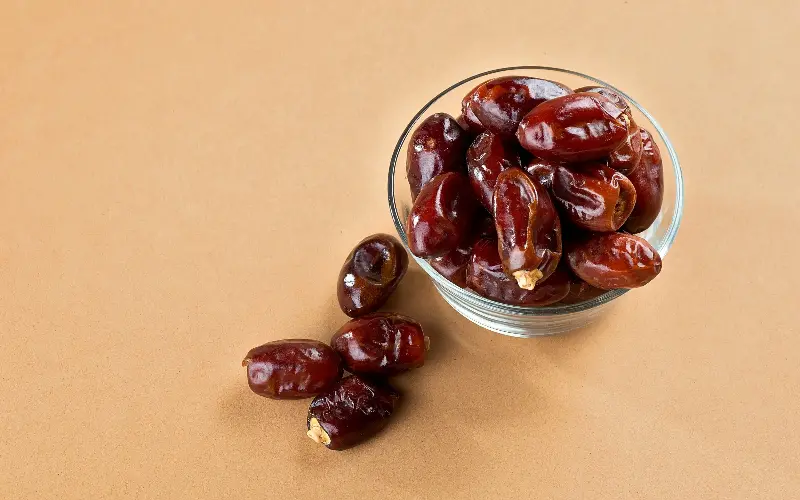
Caramelly and chewy, dates are nature’s candy – a toffee-sized fruit to satisfy sweet cravings in place of something that comes out of a wrapper. As a nutritionist, I’m a fan. Most in this country are sold dried, not fresh. Popular Medjool dates are larger, richer, softer and therefore pricier than Deglet Noor which have a lighter honey flavour. Either can be enjoyed just as they are, or else added to all manner of both sweet and savoury dishes.
Culinary versatility is one of the beauties of dates. Think past date loaf and experiment with adding sweet notes to savoury salads, throwing a handful chopped into a bowl to balance out peppery rocket or sharp cheese. Or try soaking dates in a little hot water for a few minutes then blending into anything from a sweet-and-sour marinade to a sweet-and-acidic vinaigrette. Whizzed to a sticky paste in a food processor, dates also help bind reduced-sugar bakes such as brownies.
At their simplest, though, dates can be slit open, pitted and spread with anything from melted chocolate to nut butter to soft cheese. Although more costly than dried fruit such as raisins, dates are so intensely sweet that a little goes a long way. They have a long shelf life, too, so you can enjoy one or two then store the rest in a jar ready to call on as an immediate, hassle-free and nutrient-dense snack.
Why are dates nutritious?
A small handful of dates (about 34g) counts as one of your five-a-day or 30 plant varieties a week and provides a range of nutrients:
- 90kcal
- 20g carbohydrate (naturally occurring sugars)
- High in fibre (2.6g)
- High in potassium (247mg)
- Source of iron (0.75mg)
- Source of copper (0.01mg)
- High in chloride (6.1mg)
- High in manganese (0.23mg)
- Source of vitamin B3 (niacin, 1.1mg)
Dates also provide some magnesium and calcium. Many dried dates contain the allergen sulphur dioxide so check labels if necessary.
The health benefits of dates
1. Dates support heart health
As fibre-rich carbohydrates, dates help protect the heart: eating more fibre has been linked to a lower risk of cardiovascular disease, Type 2 diabetes and obesity, as well as lower cholesterol and lower blood pressure. Fibre does all this in three ways:
- It keeps us feeling fuller for longer which can help maintain a healthy body weight, in turn benefitting blood pressure, blood sugar and cholesterol management
- It takes longer to digest, delaying the rate at which glucose and fats in our meals are absorbed into the bloodstream
- It provides food for the friendly bacteria in our guts, encouraging the production of short-chain fatty acids, or SCFAs. These SCFAs are thought to have cardio-protective characteristics.
2. Dates are good for the gut
As well as being beneficial to heart health, fibre and SCFAs are central to a happy gut, both nourishing the friendly bacteria in our gut microbiome and protecting the gut lining itself. Together these promote a flourishing, healthy gut which has been linked to improved immunity and overall well-being. Polyphenols – powerful compounds contained in all plants, including dates – also nourish our gut microbiome.
To reap all these benefits, including keeping our digestive system regular, we should aim to eat 30g of fibre daily but the average UK intake is closer to 18g. Hitting 30g in a day’s eating might look like:
- A handful of dates (2.6g fibre)
- A bowl of porridge topped with sliced banana and chopped nuts (8.5g)
- Hummus, granary bread and veggie sticks (12.5g)
- Vegetable and lentil ragù with wholewheat spaghetti (6.5.g)
3. Dates are micronutrient-rich
A handful of dates provides a range of vitamins and minerals which count towards our daily micronutrient targets and help us feel at our best. They’re high in potassium and chloride, which control fluid balance, and iron, which helps make the red blood cells that carry oxygen around our bodies. We also need the copper in dates to produce red and white blood cells. They’re equally high in manganese, needed to activate enzymes in our body, including those required for digestion. Finally, they provide vitamin B3 (or niacin) which also promotes digestion by helping us release energy from food, as well as supporting the nervous system.
4. Anti-oxidant and anti-inflammatory properties
As noted above, dates are rich in many polyphenols. These include beta-carotene, lycopene, flavonoids and anthocyanins. All have anti-oxidant and anti-inflammatory characteristics, meaning they help protect the cells in our bodies from damage, illness or toxins. Scientific interest in polyphenols is high and a growing number of studies indicate these polyphenols may have a role to play in either preventing or treating cardiovascular disease, cancer and obesity.
5. They slow glucose absorption
Sweetened only with fructose (natural fruit sugar), dates make a nutrient-dense, wholefood swap for a processed biscuit when we’re craving something sweet. Their GI index – that is the measure of how quickly foods raise blood glucose – is low to medium because their high-fibre content slows digestion, preventing sugars from spiking. ‘Dressing them up’ by eating them alongside some protein and healthy fat (for example by mixing them with nuts or nut butter) will also blunt glucose absorption. Put together, these factors help you avoid the energy-and-mood roller-coaster of sugar spikes followed by slumps that you’d instead get from eating a sweet biscuit.
All the same, it’s important to remember that dates are still high in sugar, fruit sugar or not – so they’re not to be eaten without any moderation. If consumed regularly in excess, dried fruits, like dates or apricots, can damage teeth, both because they’re sugary and because they’re sticky and tend to coat tooth enamel. Offset this by eating them either as part of a meal or, if snacking, pairing with another food (like that nut butter again).
What does a portion of dates look like?
Limit portions to a small handful. It’s easy to over-consume dried fruit because it’s small and snackable: you’d likely never eat more than one or two whole fresh apricots at once, for example, but you might get through a great many more dried ones without really considering it. And although we tend to normally only eat dates dried, not fresh, the same principle applies and can be useful to help us visualise appropriate portions. In doing so, we can keep sugar and energy intake in check.
Using dates in baking
Whilst we talk sugar, a final footnote on baking. There’s a myth that baking with syrups such as date, maple or honey is more nutritious than baking with caster sugar. It’s true that these liquid sweeteners contain less sugar (versus 100g caster sugar, honey contains 80g, date syrup 66g and maple syrup 65g) but do be aware that they’re all still considered free sugars and your body will treat them all equally.
Free sugars are any that are added to food and drink, plus the sugar in fruit juice, honey and syrups – and we should aim to limit them to prevent tooth decay and weight gain. In any case, blending dates whole at home retains the fibre and other nutrients whilst a shop-bought bottle of date syrup has had all these valuable nutrients stripped out during processing. So, if you want to try baking with date syrup, don’t buy it, make your own easy version at home (see Tip 1 below).
FAQs
Are dates high in iron?
Yes, they’re a good plant-based source making them particularly useful for vegetarians and vegans who must ensure they get enough. Dried apricots are high in iron, too, so mixing the two fruits together in the muesli and salad below is a simple way to boost intake.
Are dates good for arthritis?
The polyphenols in dates may help manage arthritis but current scientific evidence isn’t conclusive. The NHS recommends a healthy balanced diet to those suffering with arthritis, centred on a variety of fruits and vegetables, wholegrains, healthy fats plus meat, fish, eggs or plant-based protein, such as beans and legumes.
